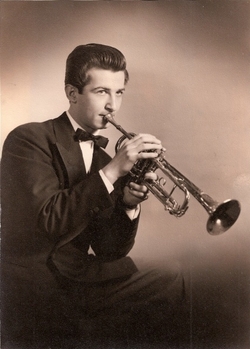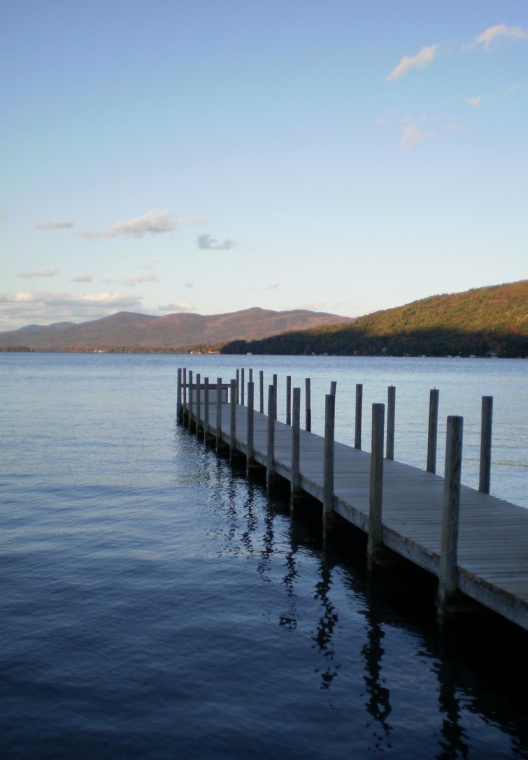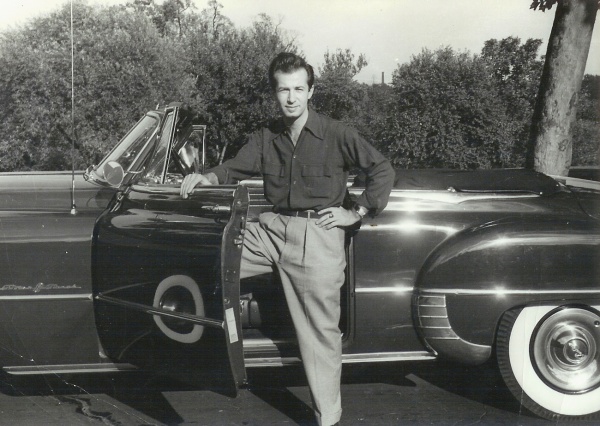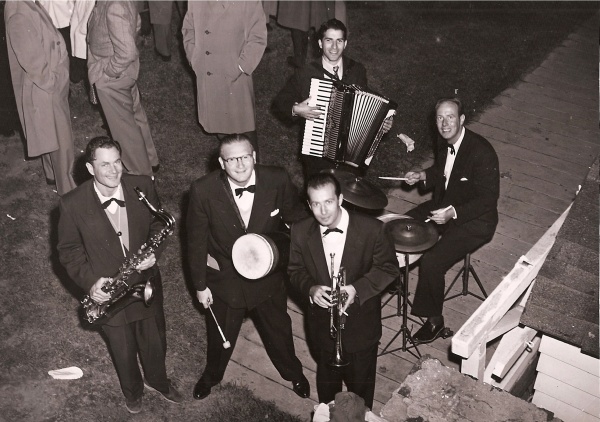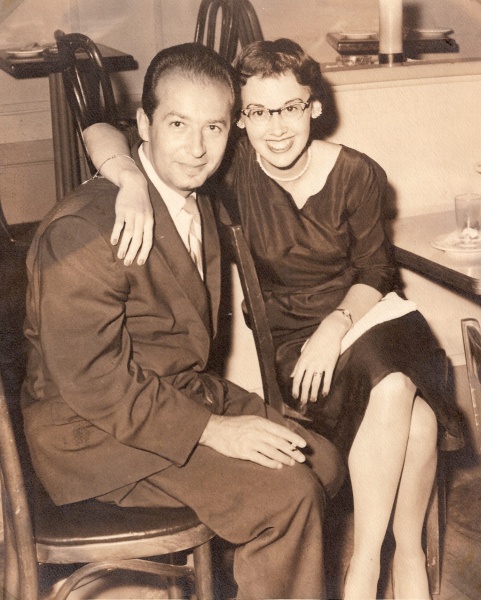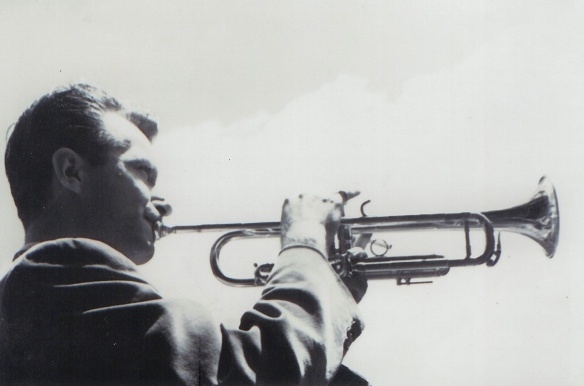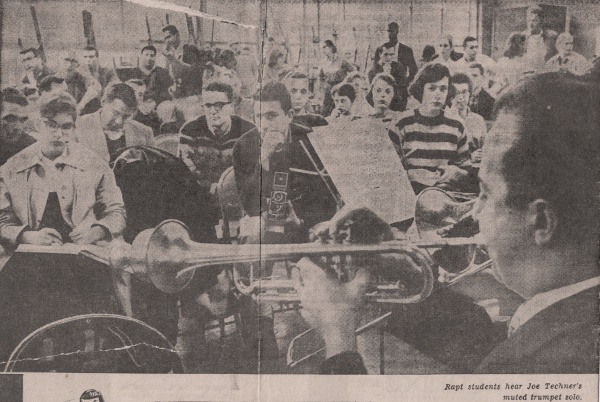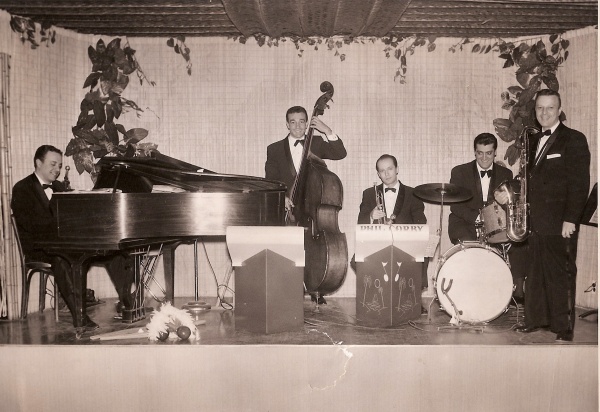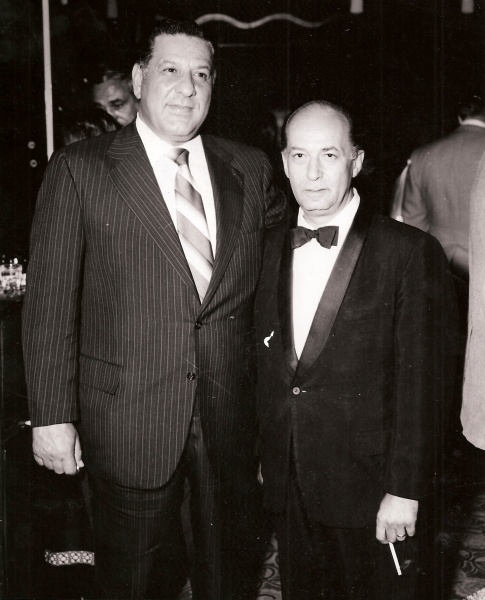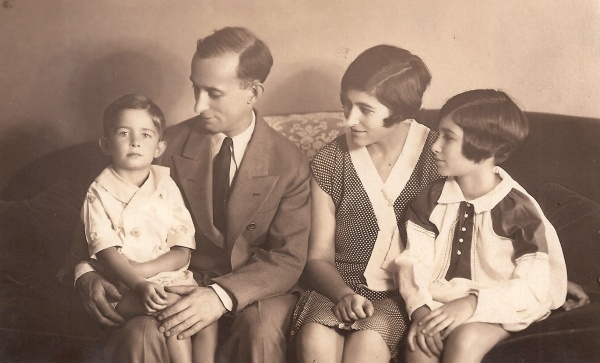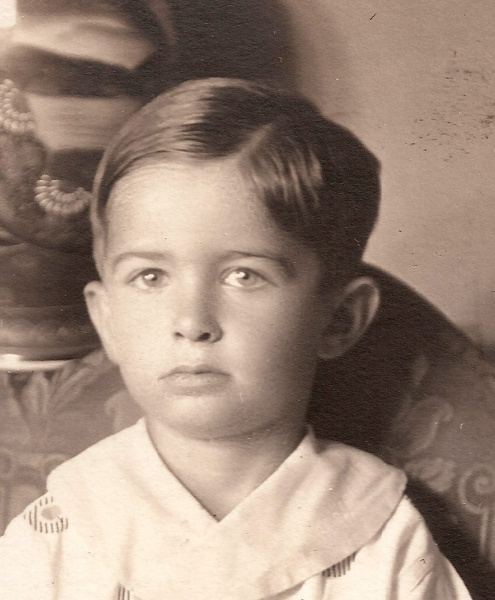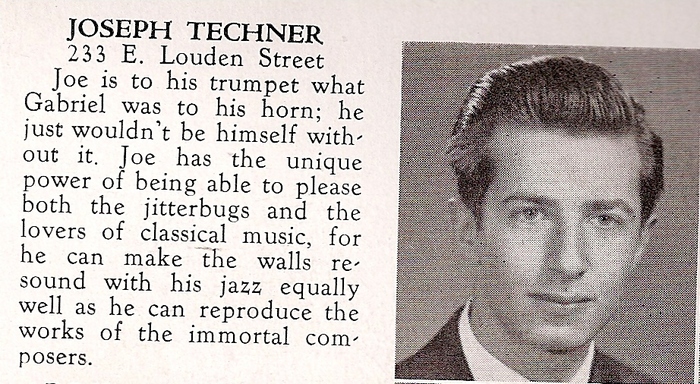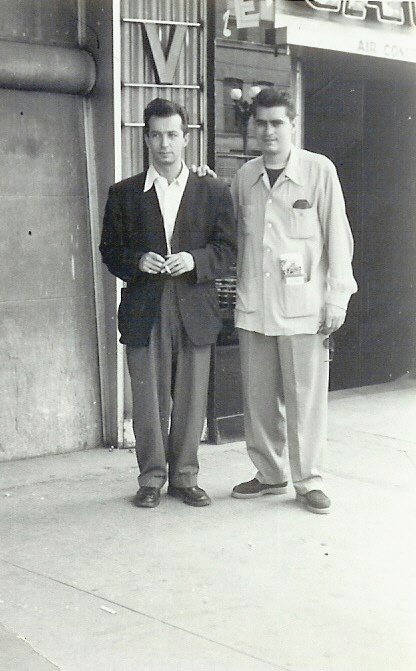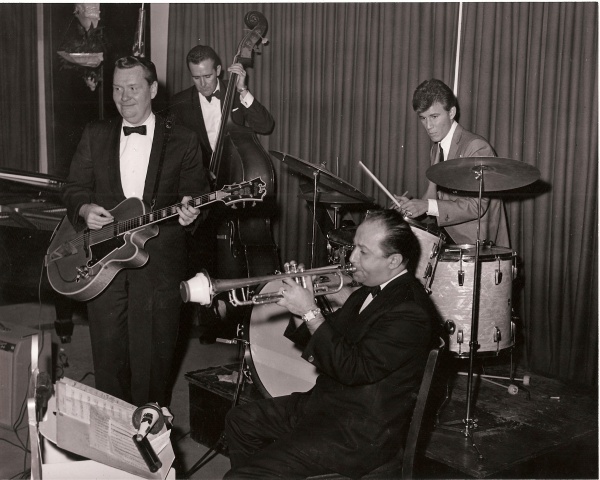Joe Techner was born October 30, 1925 in Philadelphia. His parents, Israel and Dora, were Jewish immigrants from Eastern Europe. He was first generation American. As a boy, he loved riding his bike and playing at the Feltonville playground. He grew up on Louden Street in the Feltonville section of the city. He loved music and played the mandolin as a boy. He was very close to his older sister Ann. At 13, he asked for a trumpet. He was very talented and worked very hard to learn to play the trumpet.
He studied under Donald Reinhardt at his Center City studio where he learned the pivot method and went to Mastbaum Vocational School for music. Red Rodney (Robert Chudnick) was a fellow trumpet student there.
In January 1944 he graduated Olney High with the following yearbook remark, "Joe is to his trumpet what Gabriel was to his horn; he just wouldn't be himself without it. Joe has the unique power of being able to please both the jitterbugs and the lovers of classical music, for he can make the walls resound with his jazz equally well as he can reproduce the works of the immortal composers."
Upon graduation he was immediately drafted in the Army. His induction record stated, he "was employed by the Tower's Pit Band, Towers Theater, Camden, NJ, for 4 months prior to induction. Has also played with Alex Bartha, Bob Chester and other. Played popular music. Played both solo and lead parts on the trumpet."
From February 1944 to April 1946, he served in the Army of the United States as a trumpet player in Army bands. After basic training in Camp Wheeler, Georgia, he went to Camp Shelby, Mississippi where he was in the 106th Army Ground Forces Band. He continued with this band at Fort Campbell, Kentucky until his honorable discharge as Staff Sergeant in the Spring of 1946. While at Campbell, he became close with Joe Kuhn, the early composer for 101 Strings and Somerset records.
Upon returning home, Joe recalled, "I played trumpet around Philadelphia and then went on the radio locally with Elliot Lawrence, then on the road until he broke up. I went with other bands - Jimmy Dorsey, Hal McIntyre, etc. I got weary playing, but was making money and saving. Came back to Philadelphia after New York - the most lousy city in the country. I played all the clubs and theatres - I really enjoyed the musicals. They would sometimes open here so we had lots of time of rehearsing. Good money, but feast or famine!"
Joe became known as one of the top be-bop jazz trumpet soloists in Philadelphia. He was "legit" and could play anything put in front of him and any style. When it came to the horn, he was always consistent and played sweet sounds. He could easily blend a riff of one tune into another and have it come out well. Joe's favorite horn was an original Chicago E. Benge.
Joe was picked up by the Bob Sheble local band in 1946. He also worked some of the Cuban "rumba" bands in Philly that were hot in 1946-47. One of their gigs was the Cadillac Tavern at Broad and Roosevelt. He spent summers with Ross Raphael touring the "borscht belt" in New York. Lake Spofford Hotel in New Hampshire was a favorite spot.
During this time, Joe had been listening to the Elliot Lawrence band late at night on their remote broadcasts. He and other Philly players liked the caliber of the musicians. Sometime around late 1948 and early 1949, Joe was recommended as trumpet for the band. He was most likely recommended by Alec Fila who had left the trumpet jazz chair position in 1948 to join Bob Chester -- a band that Joe was with prior to his induction in the army. Or he could have been referred by Red Rodney who was Elliot's first trumpet jazz chair and left in 1945 to join Gene Krupa. Red Rodney and Joe went to Mastbaum high school together. In any case, by March 1949, Joe was a trumpeter in the band and held the "jazz chair" position in Elliot's road band until it was disbanded in July 1951 at Atlantic City's Steel Pier. The band traveled thousands of miles across North America appearing on television, radio broadcasts, ballrooms, colleges and proms. The band appeared at the Paramount Theater in New York and Blue Note in Chicago. Gerry Mulligan did many of the hot jazz arrangements.
Joe perfomed a trumpet solo on the band's most important recording, Elevation, April 13, 1949. It was a Mulligan arrangement and later was voted by the Smithsonian Institute as one of the 50 top jazz recordings of the twentieth century. Personnel: Joe Techner, Johnny Dee (John DeFrancesco), and Jimmy Padget, trumpets; Sy (Seymour) Berger, Vince Forchetti, and Chuck Harris, trombones; Bill Danzeisen, trumpet and French horn; Joe Soldo, Louis Giamo, Phil Urso, Bruno Rondinelli, and Merle Bredwell, saxophones; Bob "Otto" Karch, pianos; Tommy O'Neill, (string) bass; Howie Mann, drums. Gerry Mulligan was also present for the recording. Originally issued on Columbia 38497.
Joe returned to Philly after the band's breakup. In late 1954 - early 1955, he contracted the demo version of Joe Valino's recording of Learnin' the Blues.
In the 1940's and 50's the jazz scene in Philly was hot. Some of the well-known spots Joe worked were Billy Krechmer's Jam Session Club, 1500 block Ranstead St.; Pep's Musical Bar 516 S. Broad St., the Latin Casino 1309 Walnut St., The Blue Note at 15th and Ridge, Frank Palumbo's The Click Café at 1526 Market, The Downbeat Club at 23 S. 11th Street, Lee Gruber's Rendezvous 915 Walnut St. and the Showboat on Lombard Street among others. Joe also worked the AC and NJ scene, including a Latin club called Mambo City in Atlantic City and with the Don Haven Band at Chubby's Cafe & Tropical Room on the Black Horse Pike in West Collingswood, N.J.
Joe was working many of these clubs and steady Broadway show gigs at the Forrest and Shubert Theaters in Philadelphia when he met his wife Dolores MacLachlan in 1956. Joe and Dee met at Music City, a store on Chestnut Street above 18th Street where Joe performed informal jam sessions with the house band on Tuesday nights. The couple were married June 19, 1956. One week later, jazz trumpeter Clifford Brown died in a tragic auto accident after finishing his last performance at Music City.
Joe and Dee remained in Philadelphia and raised a family. Their two sons were born 1958 and 1964.
Joe continued to work the Broadway shows and nightclubs throughout the fifties. In 1957, Joe Techner & His Orchestra (briefly renamed the Hi-Hatters) appeared steady at the Marlton Manor on Route 70 in Merchantville, NJ. The personnel included Ralph Massetti, piano; Mike Goldberg, sax; Ralph Mauritzio, drums, Ted Gerike, drums. The Hi-Hatters also appeared at other spots, including the Latin Villa, also on Route 70 (Marlton Pike) in late 1956.
About 1956 - 1957, Joe appeared under the ficticious name "Aron Dubois" on the three Left Bank Bearcat long-playing records issued on the Somerset label. These were recorded with his Army buddy Joe Kuhn. Personnel: Aron Dubois is Joe Techner (tp), Marcel Durand is Al Leopold (tb, ldr), Jack Bonner is Frank Lewis (cl), Bertrand Gasté is Bernie Lowe (p), Robert Eluist is Billy La Pata (bj, g), Jon Gautreaux is Joe Kuhn (b, tu) and Jacques Cas is Jack Cassidy (d).
In 1959 he was working with Howie Reynolds at Sciolla's Café at 521 W. Pike Street. In 1962, Joe was working at Lilian Reis's Celebrity Room on Juniper below Locust. Reis was a a notorious personality at the time. "They Call Me Tiger 'Lil" was the headline in her October 26, 1963 Saturday Evening Post cover story.
In 1963, Joe was at the Drexel Brook in Drexel Hill, Pa. Ralph Massetti, piano; Joe Techner, trumpet; John Hyland, drums. He was working there the day President Kennedy was assassinated. It upset Joe enough that he left his horn at home. His wife brought him the horn by bus only to find that all entertainment was cancelled due the President's death.
Throughout the sixties, Joe did a lot of recording for the Cameo - Parkway label at their 212 S. 12th Street studios and later Broad and South Street location. He recorded for Dave Appel, Bernie Lowe and Joe Tarsia. He also did recording work at the earlier 212 S. 12th Street Reco-Art Studio in Philadelphia and Bell Studios in New York City.
During the sixties, Joe worked Henri's Restaurant on Haddonfield Rd. across from the Garden State Race Track, with Vince Edwards (Dr. Ben Casey) at The Surf Club in Wildwood and with Phil Corby's band at The Hawaiian Cottage in Cherry Hill, NJ. He worked countless other engagements in the Philadelphia and Jersey shore area during this time.
About 1969 to 1971, Joe continued to play professionally with society leaders Howard Lanin and Meyer Davis.
In 1971, Joe organized a "roast" for Frank Rizzo with Phil Corby and Mark Davis, society band leader. A fund-raiser dinner was at the Pen & Pencil Club.
About 1971, Joe worked steady at Palumbo's Restaurant CR Lounge with leader Carmen Dee. Joe finally put down the horn in 1974. Joe was a City of Philadelphia employee from 1972 to 1982.
Joe was an active volunteer for the Frank Rizzo re-election campaign during the 1987 mayoral election. Joe suffered a stroke in October 1988 and died in 1989. His ashes were placed in Lake George, New York. He told his family that this was the most beautiful place he had ever seen. He had spent the summer of 1953 here at the Hotel Sagamore (Lake Bolton) while playing with the Marty Portnoy band.
You can listen to my father's recordings on YouTube. They were linked in his biography but Find A Grave removed them at some point.
Joe Techner was born October 30, 1925 in Philadelphia. His parents, Israel and Dora, were Jewish immigrants from Eastern Europe. He was first generation American. As a boy, he loved riding his bike and playing at the Feltonville playground. He grew up on Louden Street in the Feltonville section of the city. He loved music and played the mandolin as a boy. He was very close to his older sister Ann. At 13, he asked for a trumpet. He was very talented and worked very hard to learn to play the trumpet.
He studied under Donald Reinhardt at his Center City studio where he learned the pivot method and went to Mastbaum Vocational School for music. Red Rodney (Robert Chudnick) was a fellow trumpet student there.
In January 1944 he graduated Olney High with the following yearbook remark, "Joe is to his trumpet what Gabriel was to his horn; he just wouldn't be himself without it. Joe has the unique power of being able to please both the jitterbugs and the lovers of classical music, for he can make the walls resound with his jazz equally well as he can reproduce the works of the immortal composers."
Upon graduation he was immediately drafted in the Army. His induction record stated, he "was employed by the Tower's Pit Band, Towers Theater, Camden, NJ, for 4 months prior to induction. Has also played with Alex Bartha, Bob Chester and other. Played popular music. Played both solo and lead parts on the trumpet."
From February 1944 to April 1946, he served in the Army of the United States as a trumpet player in Army bands. After basic training in Camp Wheeler, Georgia, he went to Camp Shelby, Mississippi where he was in the 106th Army Ground Forces Band. He continued with this band at Fort Campbell, Kentucky until his honorable discharge as Staff Sergeant in the Spring of 1946. While at Campbell, he became close with Joe Kuhn, the early composer for 101 Strings and Somerset records.
Upon returning home, Joe recalled, "I played trumpet around Philadelphia and then went on the radio locally with Elliot Lawrence, then on the road until he broke up. I went with other bands - Jimmy Dorsey, Hal McIntyre, etc. I got weary playing, but was making money and saving. Came back to Philadelphia after New York - the most lousy city in the country. I played all the clubs and theatres - I really enjoyed the musicals. They would sometimes open here so we had lots of time of rehearsing. Good money, but feast or famine!"
Joe became known as one of the top be-bop jazz trumpet soloists in Philadelphia. He was "legit" and could play anything put in front of him and any style. When it came to the horn, he was always consistent and played sweet sounds. He could easily blend a riff of one tune into another and have it come out well. Joe's favorite horn was an original Chicago E. Benge.
Joe was picked up by the Bob Sheble local band in 1946. He also worked some of the Cuban "rumba" bands in Philly that were hot in 1946-47. One of their gigs was the Cadillac Tavern at Broad and Roosevelt. He spent summers with Ross Raphael touring the "borscht belt" in New York. Lake Spofford Hotel in New Hampshire was a favorite spot.
During this time, Joe had been listening to the Elliot Lawrence band late at night on their remote broadcasts. He and other Philly players liked the caliber of the musicians. Sometime around late 1948 and early 1949, Joe was recommended as trumpet for the band. He was most likely recommended by Alec Fila who had left the trumpet jazz chair position in 1948 to join Bob Chester -- a band that Joe was with prior to his induction in the army. Or he could have been referred by Red Rodney who was Elliot's first trumpet jazz chair and left in 1945 to join Gene Krupa. Red Rodney and Joe went to Mastbaum high school together. In any case, by March 1949, Joe was a trumpeter in the band and held the "jazz chair" position in Elliot's road band until it was disbanded in July 1951 at Atlantic City's Steel Pier. The band traveled thousands of miles across North America appearing on television, radio broadcasts, ballrooms, colleges and proms. The band appeared at the Paramount Theater in New York and Blue Note in Chicago. Gerry Mulligan did many of the hot jazz arrangements.
Joe perfomed a trumpet solo on the band's most important recording, Elevation, April 13, 1949. It was a Mulligan arrangement and later was voted by the Smithsonian Institute as one of the 50 top jazz recordings of the twentieth century. Personnel: Joe Techner, Johnny Dee (John DeFrancesco), and Jimmy Padget, trumpets; Sy (Seymour) Berger, Vince Forchetti, and Chuck Harris, trombones; Bill Danzeisen, trumpet and French horn; Joe Soldo, Louis Giamo, Phil Urso, Bruno Rondinelli, and Merle Bredwell, saxophones; Bob "Otto" Karch, pianos; Tommy O'Neill, (string) bass; Howie Mann, drums. Gerry Mulligan was also present for the recording. Originally issued on Columbia 38497.
Joe returned to Philly after the band's breakup. In late 1954 - early 1955, he contracted the demo version of Joe Valino's recording of Learnin' the Blues.
In the 1940's and 50's the jazz scene in Philly was hot. Some of the well-known spots Joe worked were Billy Krechmer's Jam Session Club, 1500 block Ranstead St.; Pep's Musical Bar 516 S. Broad St., the Latin Casino 1309 Walnut St., The Blue Note at 15th and Ridge, Frank Palumbo's The Click Café at 1526 Market, The Downbeat Club at 23 S. 11th Street, Lee Gruber's Rendezvous 915 Walnut St. and the Showboat on Lombard Street among others. Joe also worked the AC and NJ scene, including a Latin club called Mambo City in Atlantic City and with the Don Haven Band at Chubby's Cafe & Tropical Room on the Black Horse Pike in West Collingswood, N.J.
Joe was working many of these clubs and steady Broadway show gigs at the Forrest and Shubert Theaters in Philadelphia when he met his wife Dolores MacLachlan in 1956. Joe and Dee met at Music City, a store on Chestnut Street above 18th Street where Joe performed informal jam sessions with the house band on Tuesday nights. The couple were married June 19, 1956. One week later, jazz trumpeter Clifford Brown died in a tragic auto accident after finishing his last performance at Music City.
Joe and Dee remained in Philadelphia and raised a family. Their two sons were born 1958 and 1964.
Joe continued to work the Broadway shows and nightclubs throughout the fifties. In 1957, Joe Techner & His Orchestra (briefly renamed the Hi-Hatters) appeared steady at the Marlton Manor on Route 70 in Merchantville, NJ. The personnel included Ralph Massetti, piano; Mike Goldberg, sax; Ralph Mauritzio, drums, Ted Gerike, drums. The Hi-Hatters also appeared at other spots, including the Latin Villa, also on Route 70 (Marlton Pike) in late 1956.
About 1956 - 1957, Joe appeared under the ficticious name "Aron Dubois" on the three Left Bank Bearcat long-playing records issued on the Somerset label. These were recorded with his Army buddy Joe Kuhn. Personnel: Aron Dubois is Joe Techner (tp), Marcel Durand is Al Leopold (tb, ldr), Jack Bonner is Frank Lewis (cl), Bertrand Gasté is Bernie Lowe (p), Robert Eluist is Billy La Pata (bj, g), Jon Gautreaux is Joe Kuhn (b, tu) and Jacques Cas is Jack Cassidy (d).
In 1959 he was working with Howie Reynolds at Sciolla's Café at 521 W. Pike Street. In 1962, Joe was working at Lilian Reis's Celebrity Room on Juniper below Locust. Reis was a a notorious personality at the time. "They Call Me Tiger 'Lil" was the headline in her October 26, 1963 Saturday Evening Post cover story.
In 1963, Joe was at the Drexel Brook in Drexel Hill, Pa. Ralph Massetti, piano; Joe Techner, trumpet; John Hyland, drums. He was working there the day President Kennedy was assassinated. It upset Joe enough that he left his horn at home. His wife brought him the horn by bus only to find that all entertainment was cancelled due the President's death.
Throughout the sixties, Joe did a lot of recording for the Cameo - Parkway label at their 212 S. 12th Street studios and later Broad and South Street location. He recorded for Dave Appel, Bernie Lowe and Joe Tarsia. He also did recording work at the earlier 212 S. 12th Street Reco-Art Studio in Philadelphia and Bell Studios in New York City.
During the sixties, Joe worked Henri's Restaurant on Haddonfield Rd. across from the Garden State Race Track, with Vince Edwards (Dr. Ben Casey) at The Surf Club in Wildwood and with Phil Corby's band at The Hawaiian Cottage in Cherry Hill, NJ. He worked countless other engagements in the Philadelphia and Jersey shore area during this time.
About 1969 to 1971, Joe continued to play professionally with society leaders Howard Lanin and Meyer Davis.
In 1971, Joe organized a "roast" for Frank Rizzo with Phil Corby and Mark Davis, society band leader. A fund-raiser dinner was at the Pen & Pencil Club.
About 1971, Joe worked steady at Palumbo's Restaurant CR Lounge with leader Carmen Dee. Joe finally put down the horn in 1974. Joe was a City of Philadelphia employee from 1972 to 1982.
Joe was an active volunteer for the Frank Rizzo re-election campaign during the 1987 mayoral election. Joe suffered a stroke in October 1988 and died in 1989. His ashes were placed in Lake George, New York. He told his family that this was the most beautiful place he had ever seen. He had spent the summer of 1953 here at the Hotel Sagamore (Lake Bolton) while playing with the Marty Portnoy band.
You can listen to my father's recordings on YouTube. They were linked in his biography but Find A Grave removed them at some point.
